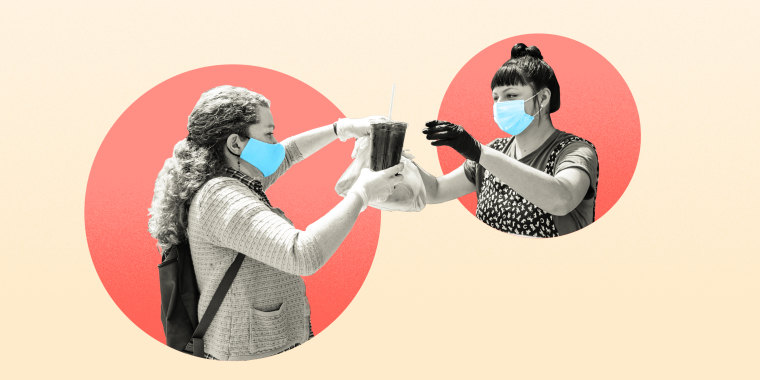As the coronavirus pandemic continues to break records across the country, restaurants are pleading for help — but the winter weather has limited outdoor dining in most of the country, and the nationwide rise in cases has led to more restrictions on indoor dining.
Infectious disease experts and public health officials say there's a simple solution that keeps people safe and can help restaurants stay afloat: Order take-out or delivery.
"Overall, the risk is extremely low," said Dr. Sunil Parikh, an associate professor of epidemiology at the Yale School of Public Health in New Haven, Connecticut, citing guidance from the Centers for Disease Control and Prevention (CDC). "You can't say the risk is zero, but compared to other activities, it's an extremely low-risk situation."
Parikh explained that the risk is so low because there is little fear of virus transmission from surfaces like takeout containers.
"As far as we know from the best science at the moment, (the virus) really is transmitted by respiratory route," he said. "While it is possible that somebody could sneeze or get saliva on the packaging, someone would then need to touch that (area of) the packaging and then touch their own mucous membrane. ... As you can imagine, that's a lot in a row to happen. You'd have to have enough virus on there at the right time, touch your own membrane and have enough virus there, and so I think when you put that all together, it's pretty low risk."
Dr. David Dowdy, an associate professor of infectious disease epidemiology at the Johns Hopkins Bloomberg School of Public Health in Baltimore, Maryland, agreed with Parikh's assessment of the risk, adding that simple protective measures like hand-washing can help reduce the chance of contracting the virus. If you are especially concerned about food packaging, just remove the food from those packages, put it on your own plates, and wash your hands after disposing of the packaging.
Dowdy also said that as far as he was aware, there was almost no risk associated with eating the food itself.
"You can never say zero risk, but the risk is very small, especially when the food has been cooked," Dowdy said. "Those who are preparing food are wearing gloves and masks themselves. The risk is not zero, but it's sufficiently low that I don't think people should be spending their energy worrying about it."
If you are ordering takeout or delivery with the hopes of keeping your favorite local restaurant afloat, try to avoid ordering from third-party delivery apps like GrubHub, DoorDash, or Seamless. While these apps are convenient for diners, they can be extremely costly for restaurants to partner with: The delivery companies charge restaurants a fee of 15 to 30% on every order, according to CNBC.
When you do order, tip generously if you can, and consider purchasing gift cards, which can help give restaurants immediate funds.
"Takeout and delivery can go a long way to supporting our local restaurants," said Parikh. "... It's a good thing for the overall economy and helps businesses, helps people ... Indoor dining isn't ideal, that's the situation you really, really need to avoid, and solutions like eating out or getting delivery are great."
Contactless delivery is the safest option, since there is no contact between restaurant staff and those ordering, but Parikh said that picking up food from a restaurant is also safe: Just wear a mask and make sure the area isn't crowded. Other steps, like paying electronically or over the phone, can make the interaction even safer.
"That just cuts down on the touching of the machine and the pen and stuff like that during the exchange," Parikh said. "Another thing is just common sense: After you get home, wash your hands."


